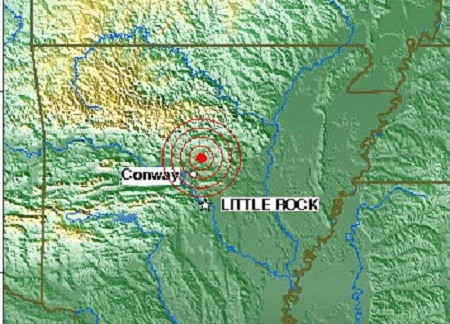Arkansas Earthquakes Could Be Man-Made

The small earthquakes that struck north central Arkansas could be from a combination of natural and man-made activity.
Some experts think that pumping water into the ground as part of the extraction process of natural gas could cause local seismic events. But the area hasn't been studied enough, they say, to know for sure.
The most intense tremors occurred just after 11 p.m. Central time Sunday, when a 4.7 magnitude quake hit Greenbrier. The next happened just over 17 minutes later, also centered on Greenbrier, and was magnitude 3.8. The latest happened at about 2:46 a.m. Monday, and was magnitude 3.6.
The earthquakes originated some three to four miles below the surface, according to the U.S. Geological Survey. The Associated Press is reporting that people as far away as Oklahoma, Missouri and Tennessee felt the 4.7 temblor. Generally, an earthquake must be magnitude 6 to do extensive damage. (The scale is logarithmic, meaning a magnitude 5 earthquake is about 31 times as powerful as a magnitude 4, and 1,000 times as powerful as a magnitude 3).
Guy and Greenbrier are near areas of extensive natural gas extraction. Dr. Hanan Mahdi, a seismologist at the University of Arkansas, said there could be two kinds of seismic activity in the area. One is natural, and the other caused by pumping salt water into the ground.
Salt water is often a by-product of natural gas extraction, and often the simplest thing to do is simply pump it back into the ground, as the water itself is often toxic. But putting the water back sometimes acts as a lubricant to the surrounding rock, Mahdi said. When the rock moves, earthquakes happen.
But it is far from clear, Mahdi said, what the cause of such earthquakes in that part of Arkansas is. People say 'well, there were earthquakes here before the natural gas companies started, why should it be different now?' she said. Really, it could be both. We need to study this more and get a better picture of the geology here. She added that one reason to think they could be man-made quakes is precisely that they were not powerful enough to do any damage.
Unlike California or the New Madrid Seismic Zone in Missouri, north-central Arkansas hasn't been deeply studied, largely because it hasn't produced destructive quakes. The New Madrid Seismic Zone produced the powerful New Madrid earthquake of 1811, and California is famous for shaking ground. But Arkansas hasn't been high on the list of study areas, even though it has a large network of small faults.
Mahdi noted that much of the fault system is unmapped, so while it is probably not worth worrying about an earthquake powerful enough to destroy homes, it is still important to understand the area's geology and the structure of the rocks -- precisely so scientists can find out if pumping the salt water back into the ground is a problem or not.
In either case, an earthquake of greater than magnitude 5.5 is extremely unlikely, Mahdi said. If you were in the New Madrid Seismic Zone I might expect it, as it has happened in the past and might happen in the future. But it hasn't happened here [in Arkansas].
One interesting characteristic of the earthquakes in Arkansas is that they came in a sort of cluster - several temblors packed close together in time and space. The quakes were also more powerful than previous events. The previous cluster of quakes was in the 4.4 to 4.5 range, whereas the most recent one was 4.7.
Scott Ausbrooks, geohazard supervisor of the Arkansas Geological Survey, said there is as yet no evidence that the wells used for the salt water are having any effect. But the local gas companies are submitting their data to the state, and as earthquakes happen they can be checked against whether a well was running. While it is true that the latest group of earthquakes happened after the wells were on line, a similar event in 1982 happened without any wells being active.
One thing Ausbrooks said should be emphasized is that there is no evidence that the fracturing or fracking of natural gas bearing shale has anything to do with the shaking. Fracking is when high-pressure fluid is used to fracture the rock, and draw out more gas. There is no data to say it's from the hydro fracking process, he said.
While there was no serious damage from this series of earthquakes, Mahdi said it is important that the public know what is happening, and make sure they are prepared if one does happen. It can be pretty frightening if you aren't expecting it, she said.
To contact the reporter responsible for this story call (646) 461 6917 or email j.emspak @ ibtimes.com.
© Copyright IBTimes 2025. All rights reserved.





















